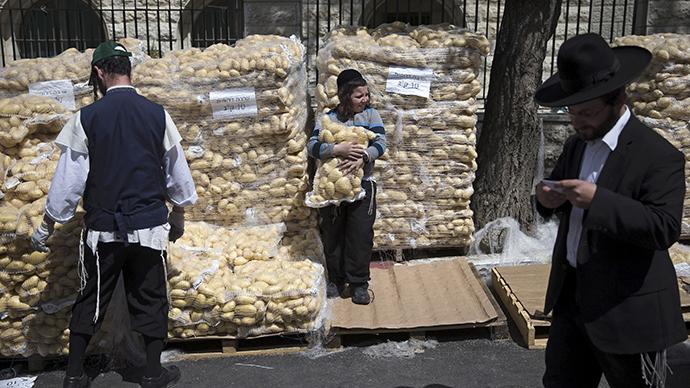Hummus-ide: ‘After Palestinian land, Israel now covets its food & culture’

Merely altering a culinary map at a Rotterdam eatery has set off a firestorm of debate regarding Israeli actions against Palestinians, which Richard Becker, a member of the anti-war ANSWER coalition, says is increasingly isolating Israel.
RT:The owners of a Middle Eastern restaurant in Rotterdam say they replaced Israel with Palestine on their map for culinary, not political reasons. Do you think they should have been more careful, given the negative reaction they received from politicians and others?
Richard Becker: The reality is that Israel has not been satisfied with just taking the Palestinians’ land, but has also for many years been appropriating Palestinian culture – including Palestinian food – and relabeling it as Israeli food. I’m talking about things like falafel, tabbouleh, hummus and other foods that are really Arab and Palestinian foods. Israel has been marketing them, pro-Israeli restaurants around the world and corporations have been marketing them as Israeli products, as an Israeli food. So, it’s very appropriate for a restaurant to do that relabeling, and say that, in fact, these are Palestinian foods, these are Arab foods, and not fall in line with this attempt at cultural appropriation on the part of the state of Israel.
READ MORE: Cookbook or Israeli propaganda? Waitrose slammed for ‘Taste of Israel’ pamphlet
RT:There are other examples where organizations, local governments or businesses boycott Israel or its products. Do you think Israel’s policy in Gaza could be the reason for such sentiment in Europe and in the US?
RB: That’s true. The owners of the restaurants say that that wasn’t their motivation. Whether it was or not it’s quite clear that Israel is becoming more and more isolated in the world because of its extreme brutality. It’s denial of human rights, its wars, as you mentioned, against Gaza, its brutality against the people in the West Bank, its settlement policy, taking more and more Palestinian lands. And the fact that all Palestinians – whether they are inside the 1948 borders of Israel in the West bank, or in Gaza, or in refugee camps around the world – are the victims of the theft of their homeland to make way for the state of Israel.
RT:Do you think European attitudes towards Israel are changing? We did see a number of countries symbolically recognize Palestine, and we’re seeing some social activism against Israel as well.
RB: There is no question that overwhelmingly the Muslim population in Europe and in the entire world understands best of any group what has happened to the Palestinians; and not just of course Muslims, but the Christians of the Middle East, and the indigenous Jewish population of the Middle East was opposed to the creation of the State of Israel. But all over the world there is a growing boycott divestment and sanctions movement that is aimed at Israeli products and particularly at products that are produced in settlements and particularly, as in this case, products that are the result of Israel appropriating Palestinian culture, including Palestinian foods. But in the overall the largest sense, Israel is becoming more and more isolated not just because of this reason, but because of its denial of the right of self-determination and its murderous brutality against the Palestinian people.
READ MORE: Off the menu? Dutch restaurant wipes Israel off culinary map, outraging politician
RT:What’s the attitude of Israeli civilians toward the policy of its government?
RB: A very large part of the Israeli population, to be honest, is supporting the Israeli government and has moved more and more in an extreme right-wing direction. This is manifested by the most recent election that took place where you have a person who calls for genocide against the Palestinians being named the Minister of Justice, Ayelet Shaked, in the new government. There are many like her in the new government, and they were elected to positions in the Knesset in the Parliament by the Israeli population. This is not to say all Israelis – there are Israelis who are very much opposed to what Israel is doing. But the reality is that a significant part of the population is supporting the government, and of course the government who is carrying out these very brutal policies against the Palestinians.
RT:There have been calls to hold Israel accountable for its actions in Gaza at the ICC. Do you think there will be a proper investigation into its actions?
RB: I think so. You can see that there is a very big change happening in many European countries. In the other countries that were colonized by Europe – Africa, Asia, Latin America, the Middle East – people understand that Israel is a colonial project. It was established as a colonial settler project at the expense of the Palestinian people. But now more and more of the countries that were the colonizers – I’m speaking of numerous European governments and movements – are also very much opposed and coming out against what Israel continues to do, its continuation of the “Nakba” (catastrophe in Arabic) of 1948… which continues today to deprive the Palestinians of their land and their rights.
The statements, views and opinions expressed in this column are solely those of the author and do not necessarily represent those of RT.
The statements, views and opinions expressed in this column are solely those of the author and do not necessarily represent those of RT.












